The way businesses collect data is changing. But data is essential to great content strategy. That’s why content intelligence is coming into the conversation.

2022 HubSpot research says that over a third of marketers believe that data has a major impact on strategy by helping them:
- Reach their target audience
- Create more powerful marketing content
- Understand which marketing strategies are most effective
Download Now: Free Content Marketing Planning Templates
But access to data is changing rapidly due to privacy concerns, technology changes, and more. This means that businesses need to find new ways to collect and analyze data for marketing strategy.
Keep reading to discover what content intelligence is, why it’s useful, and how to make it work for you. Keep scrolling to learn more, or click a link below to jump to a topic:
- What is content intelligence?
- How to Choose the Right Content Intelligence Platform
- Content Intelligence Tools
What is content intelligence?
Content intelligence is the process of using software that combines machine learning and AI to conduct market research about the effectiveness of specific types of content to help marketers create a high-quality content strategy that they know will work.
It’s essentially a GPS that leads you to a high-quality content strategy that drives leads, conversions, and revenue.
You don’t have to guess what will be of interest to your audience because the data shows you what performs well with your audience based on market and competitor analysis.
Why is content intelligence important?
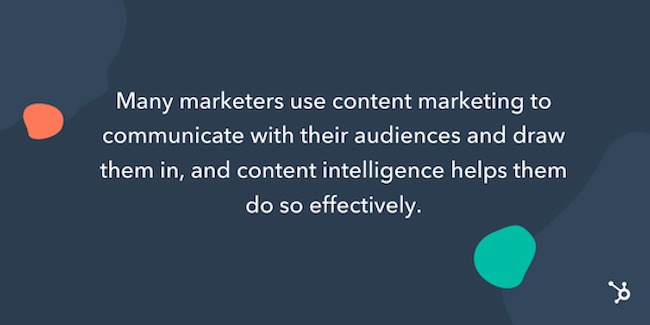
Many marketers use content marketing to communicate with their audiences and draw them in. Content marketing like blogs, webinars, social media, and online courses offer businesses a chance to connect.
Each piece of content is an opportunity to attract, engage, and delight customers.
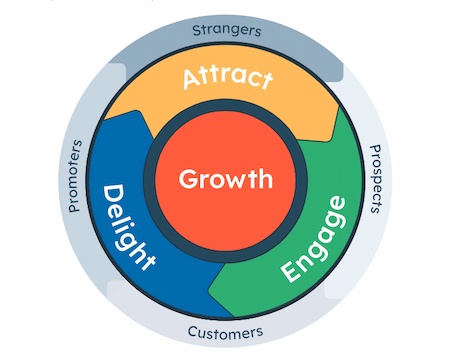
Content intelligence helps them accomplish this effectively. Other benefits include:
- Generating a deep understanding of your target audience and the type of content they enjoy based on competitor data and analysis.
- Reducing the guesswork of content creation because the AI analyzes content for style, tone of voice, and other important metrics.
- Centering content on your users and what they enjoy with data from market research.
- Gaining insight into various content types and how to create them, like video content intelligence that lets you know actions within videos that drive results.
- Ability to predict the effectiveness of your content based on the historical performance of your competitors.
- Generating authority in your niche through high-quality, informative content helps you get more visitors, increase conversion rates, and gain visibility in search results.
How to Choose the Right Content Intelligence Platform
1. Figure out what problems you need the platform to solve.
While content intelligence tools can do some of your content creation for you, these tools excel in content strategy.
This AI will use your data and organize it to find connections, trends, and patterns. This can help you pinpoint challenges, add to your data analysis, and ramp up your learning quickly.
You can use these specific recommendations to improve your content for your customers.
If you’re interested in content intelligence, chances are that your content needs work. To figure out if these tools can help, try to define your challenges in as much detail as possible.
If you’re having a tough time getting started, start with a specific problem and work backward. Trace each step you took toward this disappointing result. Then, write out your ideas for potential solutions.
2. Get to know your content intelligence platform options.
According to Statista research, only 5% of marketing professionals use artificial intelligence and machine learning. Data-driven insights from website analytics and SEO tools are popular standards.
But marketing leaders may not know anyone who’s working with content intelligence yet.
That makes research into different content intelligence platforms essential. Start with each AI tool and its features. Some will include content management tools, while others will offer content creation tools. Content intelligence platforms might:
- Create automated content with natural language generation (NLG)
- Find related or relevant content using natural language understanding (NLU)
- Use big data for content analysis
- Offer wording suggestions
- Automate content creation and promotion
- Integrate with other tools for content management
A platform with too many tools could overwhelm your team and resources. So, you’ll want to compare your ideal list of features with what each unique platform offers.
It’s also a good idea to look at your tech stack to see if any of your current content marketing tools include the features you’re looking for.
For example, HubSpot’s content assistant tool automates the content creation process by utilizing Open AI’s GPT model to generate blog ideas, outlines, and paragraphs.
It can also draft prospecting emails and marketing emails. Furthermore, the content assistant can integrate with other HubSpot products.
It can be helpful to bring in other team members during this step. A different point of view can help you narrow the scope of your search.
Featured tool: Digital transformation templates
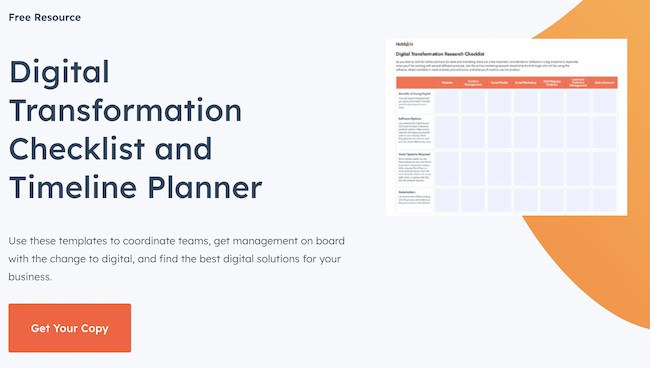
3. Find out how each platform handles data.
As you complete your research, take a careful look at how each platform collects, uses, and stores data.
Because this tool’s effectiveness comes from data, it’s important that the way each platform handles data is in line with your business policies and customer expectations.
For example, data ownership and privacy are top of mind for most customers. 86% of respondents in a 2021 Cisco survey say that they care about data privacy and 79% consider privacy a factor when making a purchase.
It’s also important to think about what types of data you’ll need to make this resource effective for your business. What if the required data preparation is too much for your team to complete consistently?
Most AI tools use many different information sources to offer predictions. A break in the data pipeline can skew the data your content intelligence tool uses to offer insights.https://www.youtube.com/embed/ybIRE2B1NkQ
4. Decide which features your team could use.
It takes time for a business to create a content strategy, execute it, and build processes around content marketing. So, any AI tool for content needs to easily fit into your current strategy and workflow.
As you narrow down your content intelligence choices, be careful not to get too excited or overwhelmed by extra features you don’t need. Try to focus on a primary point of value to weigh each feature.
As you prioritize, don’t just focus on how your employees will use the product. It’s also a good idea to ask questions like:
- How can this tool help our team meet customer expectations?
- Can this tool impact business objectives?
- Are there stakeholder ideas that we can implement with this tool?
Whenever possible, think about how this tool can improve your content marketing.
5. Align platform choices with future goals.
One of the reasons to use machine learning in content is scalability. You may not want to automate processes or create AI content now. But you also don’t know how content marketing might change in the next three to five years.
According to recent HubSpot research, 78% of marketers say that their industry has changed more in the last three years than it did in the preceding 50 years.
As search engines and other digital channels evolve, business content needs to change in response. This makes future goals a key part of your decision-making process.
For example, many vendors who offer content intelligence tools also offer other tools. If you can, research these tools at the same time you choose a content intelligence platform. This will give you a foundation for future tech stack planning.
Testing content intelligence can be difficult because this tool is most useful for content strategy. If you’ve created a strategy before, you know it can take months to execute, publish, and analyze.
So, you’ll want to do as much research as you can before you get to the next step.
6. Create a plan to put your content intelligence platform in place.
Before you commit to a content intelligence platform, it’s a good idea to create a plan for installation, training, and usage. Any tool that offers such a wide range of insights can be tough to manage.
But a plan can help you make sure that the team will get the maximum value from this investment. As you create this plan, figure out and decide:
- Which features offer the most value
- Which features will need more training than others
- Platform capabilities that are more trouble than they’re worth
This planning process may not feel necessary, but it can help you prove potential platform ROI.
And that’s not all.
An ideal content marketing strategy will connect with the right audience, support sales and service teams, and improve the quality and efficiency of your content team.
Content intelligence can support those goals and more if you’ve taken the time to prepare.
7. Test the platform.
Once you’ve narrowed your content intelligence choices down, it’s time to try out your software picks. There are a few things to keep in mind when you’re testing AI software.
First, make sure that the software meets your expectations. Check that all the features you expected are present and work properly.
If you’re unsure how to use one of those features, ensure the documentation or support team can quickly answer your questions.
Next, use your workflow to test out your new content intelligence tool. Take notes as you research new content topics, measure content performance, or update your content strategy.
This can help you find out if there are any bugs or flaws in the tool.
While no tool is perfect, you want to make sure that the extra value you’re getting is more than the extra work you’ll take on if something goes wrong.
For example, what if you’re not finding valuable resources on the topics that matter to your business? If this tool can’t find the niche content ideas you need, it may not be the right fit.
AI is complex, so you may need to troubleshoot before making a final decision.
Content Intelligence Tools
While it’s possible to conduct content intelligence on your own, the software can automate the process and generate results quickly. Let’s go over some high-quality tools you can use in your approach.
1. BuzzSumo
BuzzSumo uses a strategy of research and discovery to gain insights about the content created by your market and industry competitors to help you understand what performs best with your audience.
The tool analyzes a variety of social media feeds and web content to give you viral trends to leverage, business-related content you should consider covering, and target keywords to use when you begin creating.
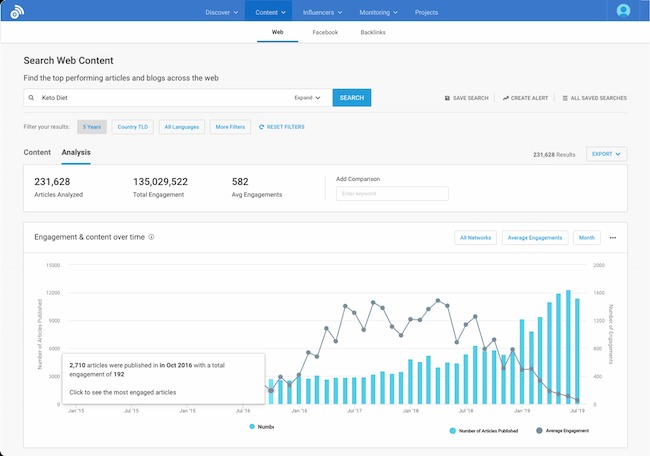
Pro tip: Use this tool’s advanced search features to get the most from their popular Content Analyzer.
2. Contently
Contently uses StoryBook™, its proprietary technology, to analyze and predict the content that will significantly impact your business.
This data will help you create a content strategy that aligns with your audience’s interest — SEO, voice, and tone, and your brand guidelines are all considered in every recommendation.
Then, when you create your content, you’ll get analytics to show what performs and drives ROI to focus your efforts further.
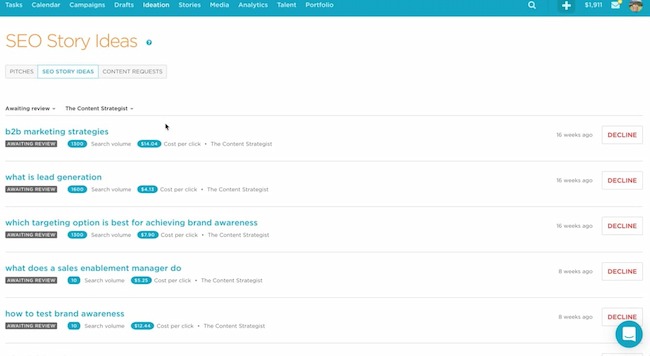
Pro tip: Use Contently’s performance analytics to measure audience engagement and compare with benchmarks in your industry.
3. Curata
Curata’s self-learning engine helps you discover the best-performing content, understand why audiences like it, and how you can create top-performing content.
You’ll also get SEO help to curate and share your content in the most relevant channels.
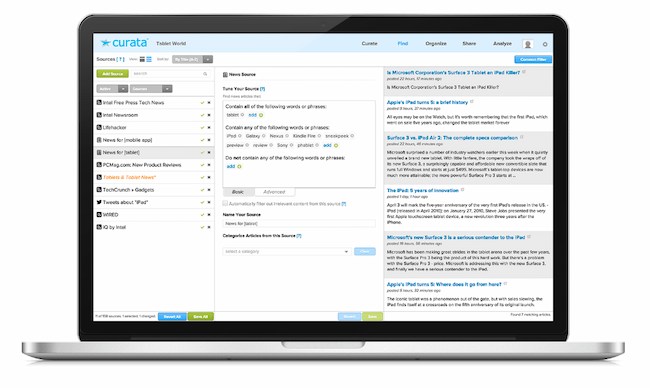
Pro tip: Try Curata’s content curation software to find and share content relevant to your target audience.
4. Crayon
Crayon’s software provides competitive intelligence to help you use actionable insights to create a high-quality content strategy.
You’ll understand what works for your competitors, from social channels to review sites, and discover key messaging that performs best that you can adapt to your content strategy.

Pro tip: Content intelligence can also be a helpful tool for competitive analysis.
Content Intelligence Can Help You Scale Your Content Strategy
The content strategy you choose depends on your business needs. But you can improve your content, strategy, and reputation using content intelligence tools. Pick the right software for you, and start growing your influence.